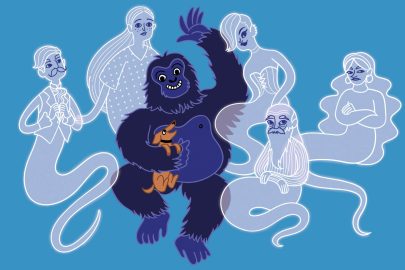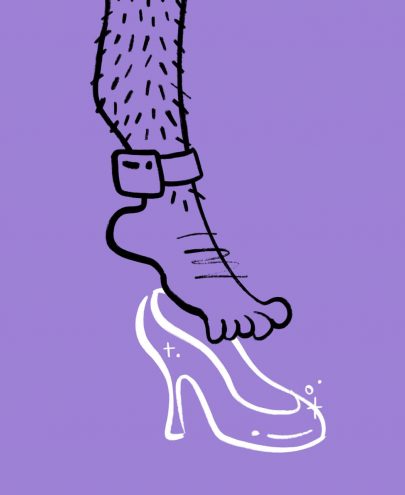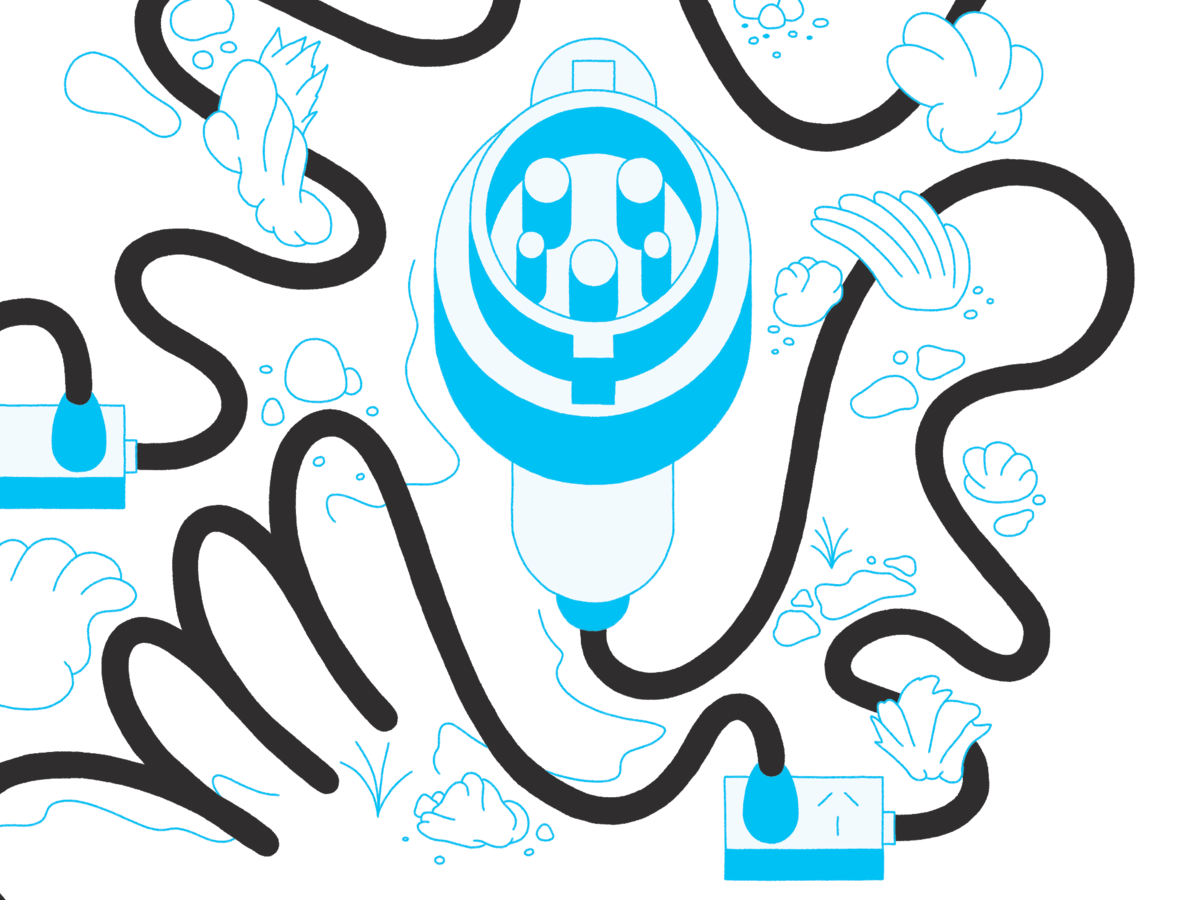Sep 20, 2016 etc
A lifelong resident of “the Rich Side” takes a turn behind the counter at a South Auckland pawnshop that doubles as a food bank for its impoverished customers.
I’d never been called “white girl” before. Largely because (as a “Shore girl”) I’d grown up, lived in and stayed in Auckland’s rich, white suburbs. Places like Albany, Takapuna and Ponsonby: all as rich and white as whipped cream. But this weekend, I was in Clendon Park shopping mall, on the outskirts of Manurewa, and there were no white people. Well, there were three. All of whom were so old they were effectively grey. So I was “white girl”, and God, did they stare.
It didn’t help that I was white and young. To my eyes, there don’t appear to be many young people there either. In Clendon Park, the teenagers look middle-aged and the middle-aged look almost dead. It’s the grimness of the dole queue, the cheap comfort of fast food, the daily struggle of just getting by. The constant reminders that society at large is ignoring you drag you prematurely towards middle age.
It also didn’t help that I had dressed wrong. I was about to work my first shift in Cash King, the pawnbroker in the Clendon Park mall. Thinking I was being an anthropologically savvy journo, I’d worn black track pants. But I’d forgotten the obvious distinction between people who wear track pants on the Shore and people who wear track pants out South. Yes, both groups wear trackies. But no, they do not look the same. Unnecessary zips? Trendy drop crotch? The fact that LES MILLS is written down one leg? I might as well have rocked up in a tutu.
Even when I turned up in neutral clothes, which I did the next few times, it was clear I was an outsider. Clendon Park is a different world from the city.
People walk differently, with a low shuffle, scuffing their socks’n’jandals and looking around with flinty stares. The buildings are different; uglier, fitted out in cheaper, nastier colours with slogans peppered with unnecessary Zs. Walking through the mall was eerily similar to the time I got lost in an Indonesian ferry terminal. It was the same sunken concrete floor, the same broken air con, the same battered grey shop fronts. Even the same jarring feeling when someone speaks to you in a language you don’t understand. Here, English is punctured with Maori, Samoan, Tongan and slang. “Chur, my bro”, “’sup bo” and of course, “palagi”. Everything is different. They even have names for the two worlds, as one resident explained to me. Anything north of Mt Wellington is called “the Rich Side”, which they don’t like and don’t go to, and everything south is “Our Side”. I was, she told me, clearly from the Rich Side.
I was relieved when I eventually found the shop and could slip on the mustard Cash King shirt.
Cash King is on the north side of the mall next to the Work and Income (Winz) office. It’s the only shop with any colour to it; an eye-popping parcel of purple and yellow dumped among the other concrete blocks. It was to be my employer for the next few weekends, while I found out first-hand what it’s like behind the scenes in a South Auckland pawnshop. Pawnshops had always fascinated me, not only because I’d never been to one, and had hardly ever even seen one where I grew up, but also because the (largely white, largely middle class) media is talking endlessly about homelessness and inequality right now.
And pawnbrokers, at the coalface of desperation and hope in poor communities, would be able to tell me what it was really like.
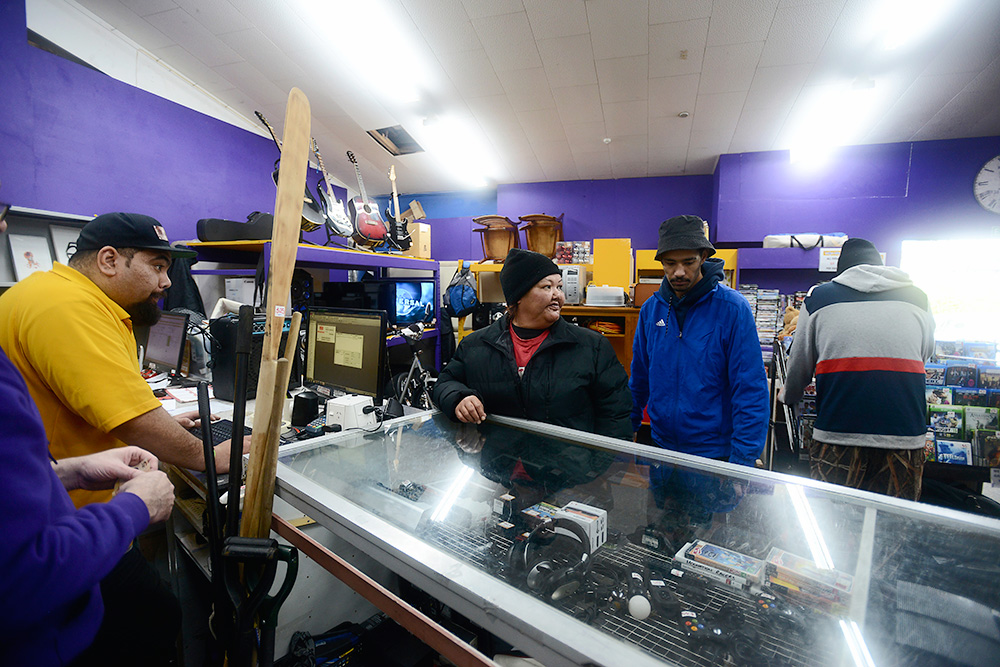
The shop is owned and run by Nick Finestone, who took it over in January after a long stint working there. The front and the inside front wall are a blistering purple, as are the glass-fronted shelves lining the left-hand wall. It’s stacked with a mixture of the normal and the grimy. Stuff overflows from every corner; tablets, phones, speakers and PlayStation 3s nestle under the glass counter at the back of the shop, bikes line the far right wall beneath the TVs, there are couches, fridges, tables and a stack of DVDs along the inside wall, and a long glass counter to the left where they keep the PS3s. There are no Apple products.
The electronics are easy to look at. Out the back is the heartbreaking stuff: overalls, tools and thick boots… the work materials of the people who pawned them, their source of income — and identity. They’re still waiting for their owners to rescue them. The kai cooker is another sad sight. It sits there without its family, forlorn and grey. And then there are the wedding rings, stashed tightly inside their little plastic tombs. Diamonds from a time when the future looked more sparkly.
Then there are the wedding rings, stashed inside their little plastic tombs. Diamonds from a time when the future looked more sparkly.
Shit, it’s grim. But the guys behind the counter are chipper. Matt Vaka’s in his early 20s, a Kiwi-born Tongan-Cook Islander with soft eyes and a battered flat-brim cap. He’s funny and gentle, and jokes, “You gonna be right out there…? It’s South Siiiiiide!” every time I go outside. There’s Angie Finestone, Nick’s wife, who previously was a teacher at James Cook High School. She’s warm-hearted but seems wary of me.
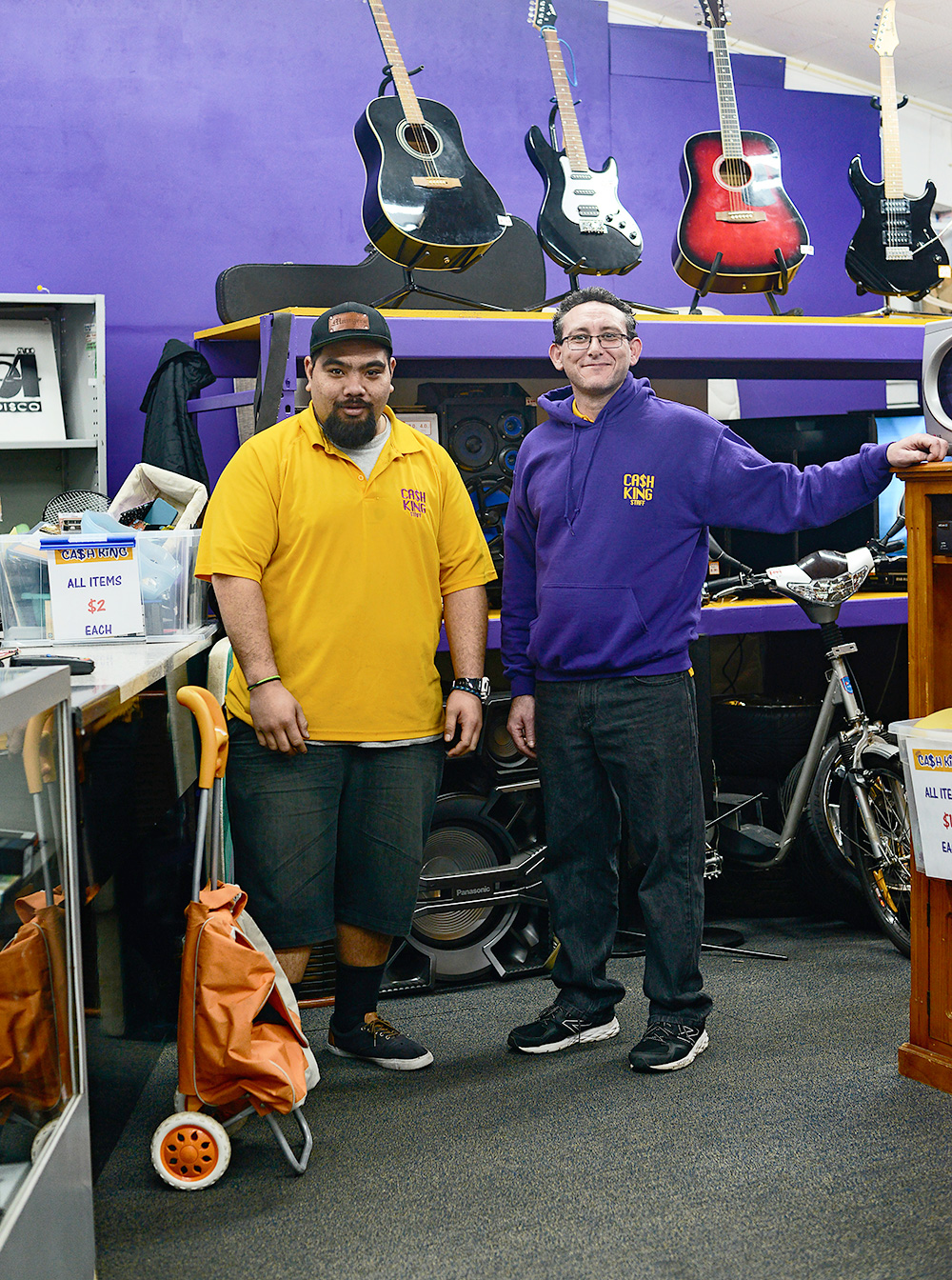
And, of course, there’s Nick, the owner. Nick is late 40s, white and wiry, with curly brown hair and a bad back from being crushed by a pig carcass back when he was a butcher. He’s an unimposing guy, but has a cheeky, rough charm that calms the locals in an almost hypnotic way. He keeps his good side hidden by constantly ribbing Matt and swigging on beer. But it is there. Just the other day, he intervened in a domestic happening outside, calming the guy down long enough for the girl to escape. He’s also the one who started the food bank in the shop.
In many ways, that food bank is the answer to my question. What’s it like behind the scenes at Cash King? It’s like being inside a lifeline. This small, purple pawnshop has become, of all things, a social safety net.
Nick started the food bank when he took over at Cash King. The idea is that if you’re pawning items to buy food, then the shop gives you a couple of bags of food for free. If you’re buying from the shop, you can donate cans and get a discount on your item. If you donate 20 food items, you get a 20 per cent discount on your purchase. I came in on the Saturday and the bank was half-empty. I came back on the Wednesday to find all the food replaced by new cans. The shop’s busiest on Tuesday, says Nick, because Wednesday is pay day. You’re at the end of your week’s wages and you’re desperate, so that’s when Cash King gives away the most food.
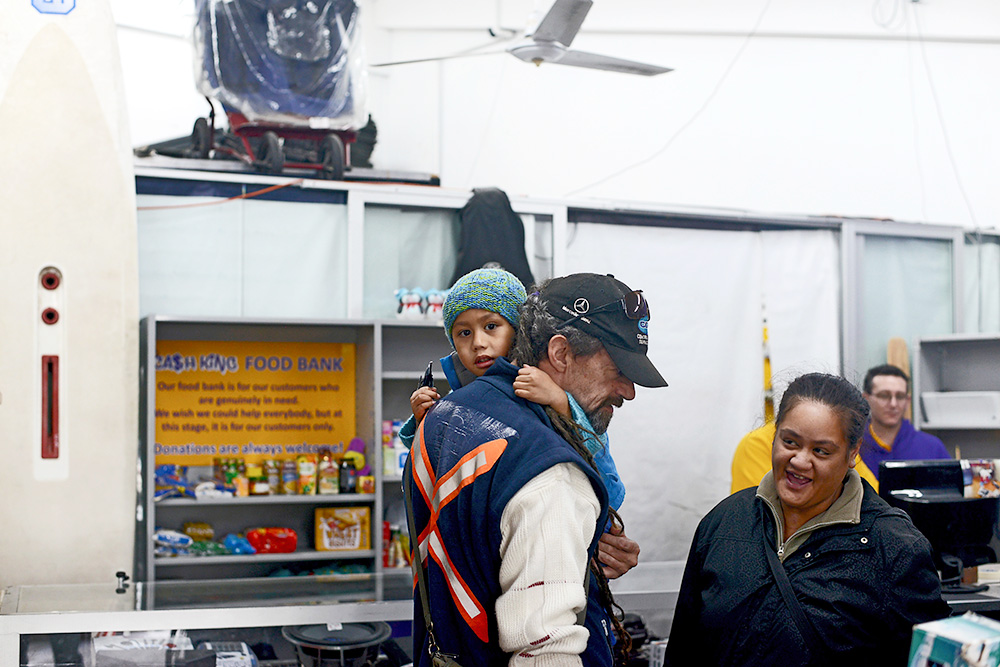
At first, I was confused by the idea of a pawnshop with a food bank. Of all the places to have a food bank — a pawnshop. Since when did pawnbrokers care? But after a while, I started to get it.
I’d never given much thought to why people pawn things. I’d vaguely assumed that they needed money for alcohol, cigarettes, drugs… all the things that we think the poor waste their money on. But the longer I stayed there, the more I realised what they’re really doing. They’re pawning for food.
Nick calls these customers a new class of people, Auckland’s “working poor”.
“It’s got worse in the last six months,” says Angie. “Maybe it was different before. People pawned for alcohol and drugs. But now they’re pawning for food and rent.” People like the 23-year-old mother of three, who asked not to be named, whose partner has lost his job. Their landlord has just increased the rent by $50 a month. She’d been scraping by before, but now she’s not. She needs $45 to make the new rent, and then she needs to do the grocery shopping. Nick calls these customers Auckland’s new class of people, “the working poor”. They’re above the homeless — but only just. One knock, like a rent spike, and they’ll fall down the ladder. And it’s not going away, says Nick grimly. “In the US, pawns are an everyday thing for everyday items. We are finding now in New Zealand that pawns are becoming more normal, more for the necessities of life than for enjoyment.” Cash King is filling this gap — by providing food loans, and providing actual food.
It’s keeping some of the locals going, like Aroha, who has been coming to Cash King for over 10 years. The 55-year-old matriarch comes when she needs money for food, power or petrol. She often sits on the bench outside Winz next door and sees angry, hungry couples leaving. “They come out swearing, saying they’ve got no food. I say, ‘Go see Nick, he’s got food. It’s tinned stuff, it’s not meat, but it’ll see you through.’ They come out with a couple of bags of food, and it’s something.” She shakes her head. “It’s something Winz should be doing, not someone like Nick. But he does it. He’s doing their job.”
It’s also clear that he’s running it more as a lifeline than a business. I often watch Nick make loans on things he doesn’t want and can’t sell. I thought pawnshops were supposed to be run by hard-arse men who send you away quicker than a cruel aunt in a fairytale. But Nick is something different.
I watch him with a greying, twitching 20-something who pawned his $120 dress shoes for $20. He says he’s on a 12-week stand-down period from Winz after leaving his job two weeks ago. He’s got no money until Thursday, no food, and he desperately needs to pay a power bill. Nick knows damn well he can’t sell shoes. He even tells the man he doesn’t want them. But he still hands over $20 for the stinking things. The guy waves a shaky hand as he leaves. “Thanks, bro! You’re the first pawnbroker with a heart!”
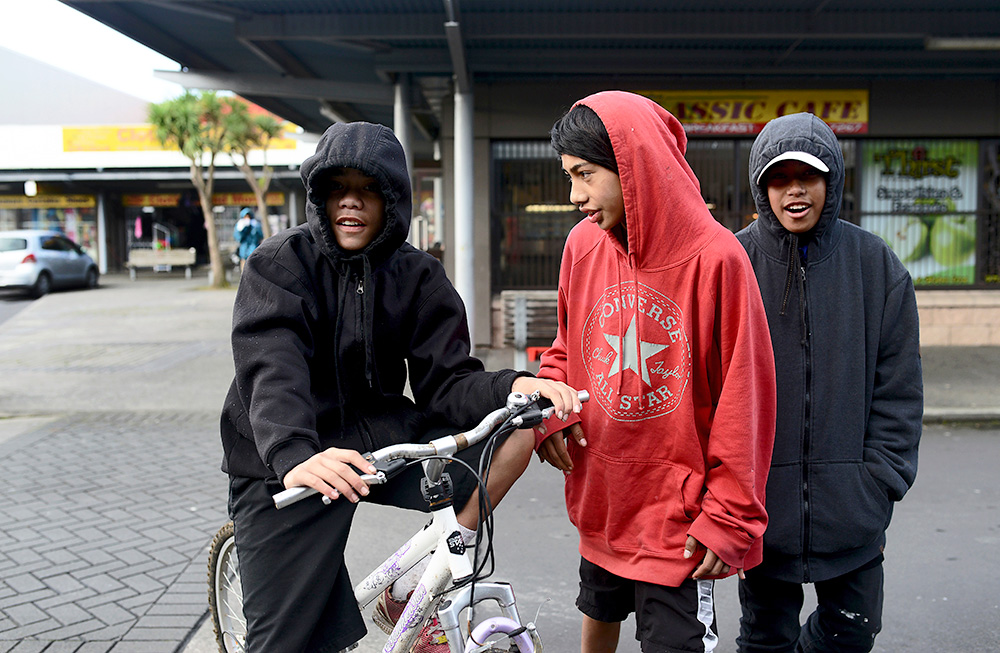
Even Aroha admits that Nick is too generous. When her daughter comes to visit, broke and hungry, she takes her to Cash King. “I pawn it with Nick and Nick says, ‘What do you want? ‘I say $200, and he gives it to me whether it’s worth $200 or not. Nick just gives it.”
When he explains their one percent-a-day compound interest rates for overdue loans, Nick pleads with them not to go over the due date. He circles it on the form, stares them in the face and says, “This is the killer, mate.” Is he trying to make money? No, he’s trying to save lives.
Nick pleads with them not to go over the due date. He circles it on the form, stares them in the face and says, “This is the killer, mate.”
And they need to be saved. You don’t understand the level of desperation here until you know who the customers are. The staff have got codes for them, and some of them are what you’d expect. Like BAM — Broke As Motherfucker — the scruffy white guy who comes in trying to pawn a Kindle. Nick sends him away with a shake of the head. No one will buy a Kindle here.
There’s also FOB, an almost totally silent Samoan tradie who comes in to get money for beer. “Beer and tinnies, mate?” asks Nick. The guy laughs and nods. And there’s TOH, a thief pawning stolen goods. “How come it’s TOH?” I ask Nick. He starts to laugh. “That’s HOT backwards, girl.” Oh.
Nick tells TOH there’s no space in the shop for what he’s got to sell. I’m about to say that there’s plenty of space, but Matt stares at me. Ohhhh. I shut up.
After TOH goes, they explain that, 1) the goods are clearly stolen; 2) they don’t take stolen stuff; 3) if they did, they’d be in serious, serious trouble with the police and in breach of their licence. Ohhhhhhhh. Nick and Matt grin at my bemusement and shake their heads. Shore girl.
But the biggest group are the struggling parents. Nick knows these guys. And once you’ve met them, and seen them bring in their kids, you can’t forget them.
There’s a construction worker who comes in with one small child on each hip. He needs money for food. He stands there, crumpled, handing over his cellphone.
He stands there, crumpled, handing over his cellphone, stooped under the weight of the kids. His face sags with exhaustion.
He’s a tall guy, but he’s stooped under the weight of the kids. His face sags with exhaustion. He leaves with two bags of food and $30 for the supermarket. I see it again and again: the parents’ slow walk, the children hesitant and skittering behind them, the eyes focused on the floor, the listlessness when they hold out their phone, their tools, their work overalls… Nick asks if it’s for the kids and they nod. There’s nothing to say. These are people with families who need them. And this is why the pawnshop is in business, because there are struggling parents who will do anything to give their kids better lives.
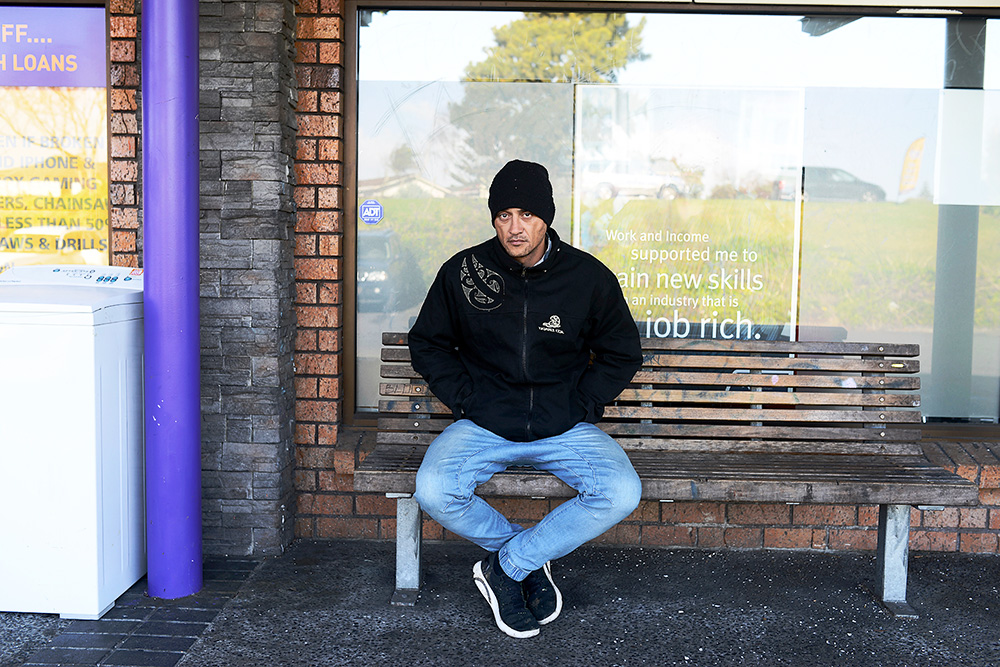
Don’t get me wrong, there are drug-addled customers pawning gear to buy their next fix. One staggers in with a hedge trimmer and asks with wild eyes what she’ll get for it. Nick tells her he doesn’t sell that kind of thing. She silently struggles out, a dishevelled, thumb-sucking child trailing behind her. Nick turns to me. He knows this family, knows that the hedge trimmers are stolen, and knows she needs money for drugs. He always says no. But has he ever given money to people he knows are addicts? He looks uncomfortable. Sometimes yes, he hesitates, sometimes no. After all, you don’t know if they’re a druggie needing food after coming off the gear, or needing money for the next fix. And if it’s not stolen property… what can you do?
That said, these guys are still in the minority. I’d gone in expecting junkies galore but saw just one over three weekends.
So where are Winz in all of this? The locals aren’t particularly fond of them. Aroha sums it up like this: Back when she first was on the benefit, about 10 years ago, “I was getting $1800 a fortnight for five kids… My daughter has four kids, and she just went on the benefit because her and her partner split. She stays up in Whangarei and gets $358 a week for four kids. And that’s for rent, putting them through school, food… it’s not enough.” It’s not just the money that’s changed, she says. “They used to be nicer. When I was on the benefit before, they were kind. They explained things to you, what you can and cannot get… but the case officers today, they don’t give a shit.”
I hear again and again that Winz staff don’t explain things to you, they don’t tell you what you’re entitled to, and aren’t clear enough about anything. When it comes to understanding what you’re entitled to, “it’s not what you know, it’s who you know”. Because if you know your officer, they’ll tell you exactly what you can get. Otherwise, you’ve no idea, says Aroha.
But it’s not just that they don’t like Winz. People here don’t trust the media, they don’t trust the government, and they certainly don’t trust the police. “The government don’t care about how we live… they [the rich] don’t care about how we live, no one’s there to help us to live or even survive,” says one resident. And when you can’t or won’t trust the system, you have to turn to each other. “You trust yourself and people who are around you going through the same thing,” says Aroha. “That’s the only way you can get help.” So they avoid the official channels, using pawnshops recommended by word of mouth.
You see just how important trust is when you see them come into the store. When they come in, they go to Matt, who’s brown, before they go to Nick. “Yeah,” jokes Nick, “it’s the only thing he’s got on me!”
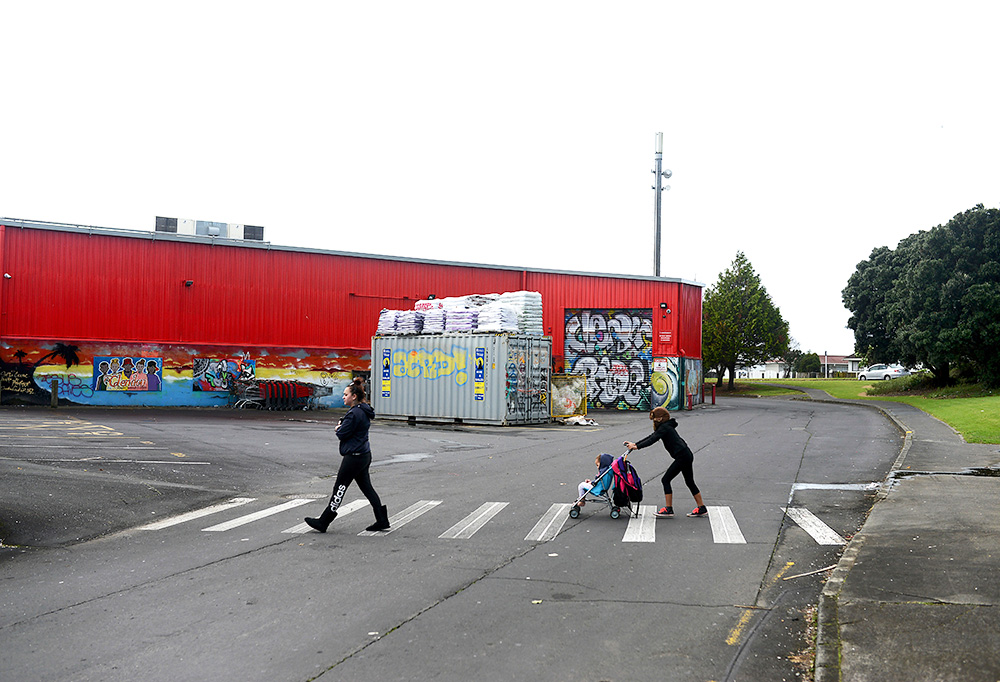
They avoid me like the plague, shuffling down to the other end of the counter and, if we do have to talk, staring firmly at my chin. Nick has had customers come in, see that he’s white, and promptly leave. They just don’t trust a white pawnbroker. He feels instantly less relatable, instantly more alien, instantly more like the people on the Rich Side.
The anger and disfranchisement are rooted in a deeply held sense that they’ve been forgotten. “They talk about South Auckland as the fucking Bronx,” says Aroha bitterly. “Yeah, fair enough, it is… no one cares about us.”
It’s hard to deny when you spend more than a few hours in this mall. It’s a grey place. It’s ugly here. It aged quickly and is falling apart slowly. And you can understand how, if they ever went to the Rich Side, they might wonder why it has leafy trees and parks with fountains, when Clendon Park gets a Warehouse and a chip shop.
Winz responds
Metro invited Work and Income to respond to claims made about Winz in this story. Here, verbatim, is the reply from Ministry of Social Development regional commissioner Blair McKenzie.
“Every day our staff come to work to help New Zealanders help themselves to be safe, strong and independent. We understand that people coming to us are in vulnerable situations and often come to us as a last resort. It can be hard, and it can be an emotional time.
“We are committed to treating everyone fairly, and with respect. To administer the welfare system consistently and responsibly, we do need to ask people questions, and we do require people to verify their circumstances through different forms of acceptable evidence. Through this process we are able to get a full picture of an individual’s circumstances. Knowing the full picture means knowing how best to help them, and what assistance they can get.
“There is a huge range of help available from Work and Income, and we encourage people in need to contact us for assistance.”

